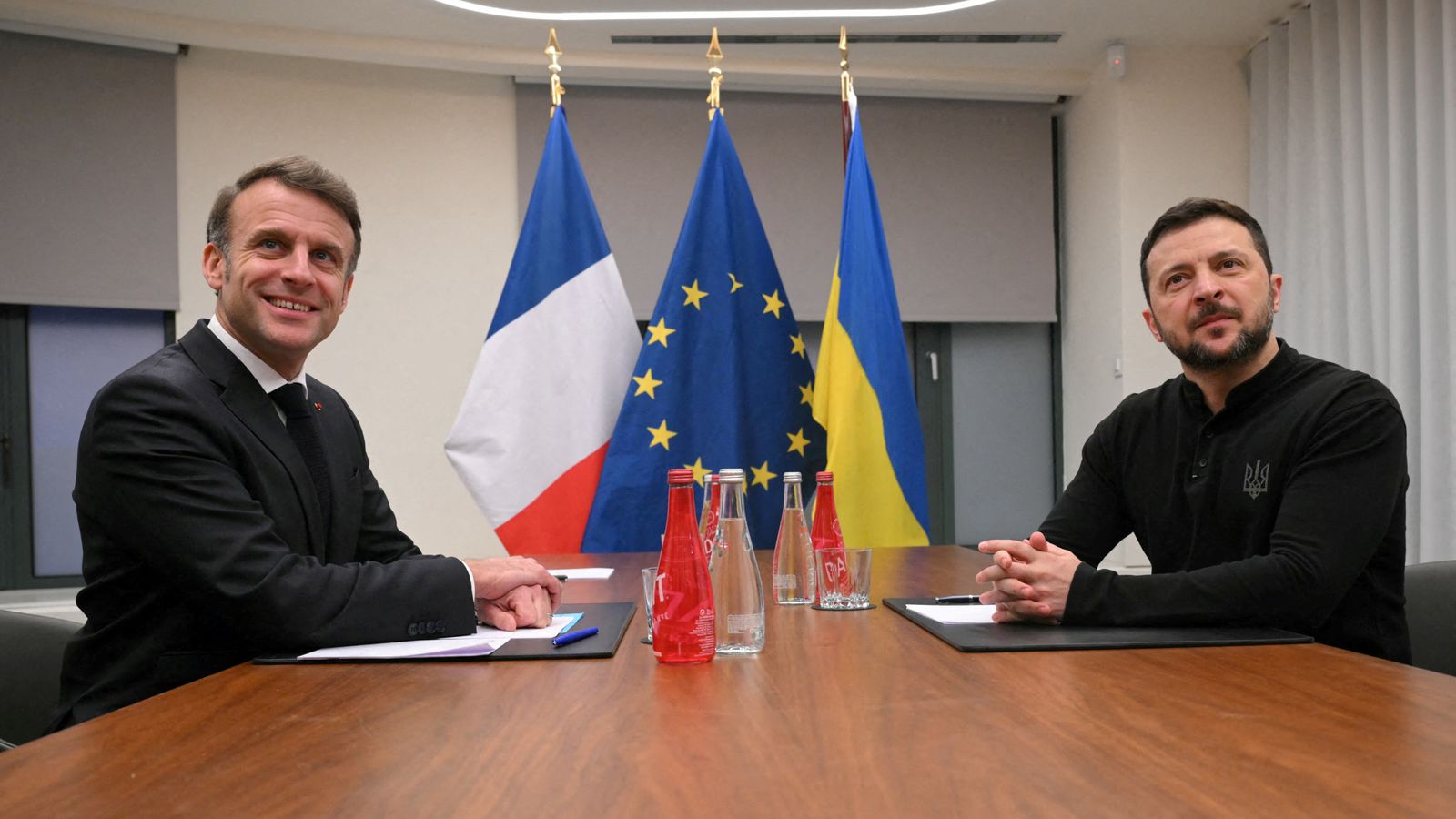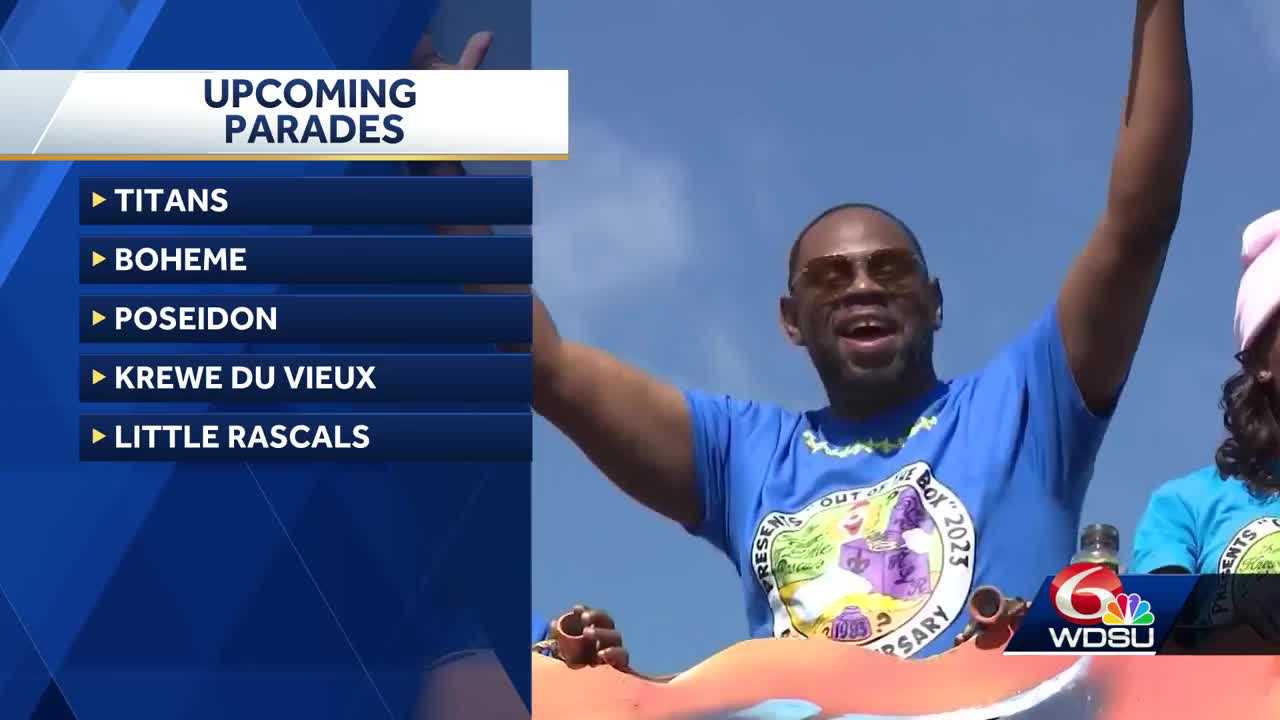
French President Emmanuel Macron is convening emergency talks on the war in Ukraine with European leaders and NATO, as US officials head to Saudi Arabia for peace talks. It comes as Starmer warns against “divisions” in the alliance.
Sunday 16 February 2025 16:01, UK
Please use Chrome browser for a more accessible video player
Thank you for follow our live coverage, we’re pausing our updates on this page for today.
Before we go, here’s a summary of all the developments from across the day…
French president Emmanuel Macron will host a meeting with European leaders on Ukraine tomorrow.
Sir Keir Starmer will be among the leaders in attendance, while European Commission president Ursula von der Leyen and NATO secretary general Mark Rutte will also attend.
The meeting comes as US and Russian officials head to Saudi Arabia to hold peace talks on the war in Ukraine.
An aide close to Volodymyr Zelenskyy confirmed Ukraine has still not received an invite to the peace talks, while Zelenskyy told our US partner network NBC News he will “never accept any decisions” made by the US and Russia in the absence of Ukraine.
As discussion over peace talks continued, the war raged on. Ukrainian officials reported Russia had launched 143 drones in an overnight attack.
It said a thermal power plant had been damaged in Mykolaiv in the south of the country, leaving thousands without power.
An Elysee spokesperson has confirmed Emmanuel Macron will be hosting a meeting with European leaders on Ukraine in Paris tomorrow.
Sir Keir Starmer will be in attendance, as well as the leaders of Germany, Italy, Poland, Spain, Denmark and the Netherlands.
It has also been confirmed European Commission president Ursula von der Leyen and NATO secretary general Mark Rutte will attend.
By Adam Parsons, Europe correspondent
There is no disguising this now. Plenty of Europe’s most prominent politicians are deeply rattled by what they’ve heard from those at the top of the Trump White House and worried about the consequences.
Emmanuel Macron, inevitably, has come to the fore, once again positioning himself as the continent’s de-facto political leader. He’ll be hosting an emergency summit at the Elysee to discuss this new world order, where America suddenly seems keen to start making friends with Russia and begin pulling its troops out of Europe.
If that fear was there already, then three things have solidified that sense. First, and most obviously, is the way in which Trump has decided to set up peace talks over the future of Ukraine, but excluded Europe – and perhaps even Ukraine itself – from those talks.
Ukraine, as a reminder, is on Europe’s eastern border. Its refugees have overwhelmingly fled to Europe. Its economy is tied in with Europe, as is its history and culture. However you dress it up, the war in Ukraine affects the future of Europe more than it does the future of America.
Second is the way in which Trump has flagged up the idea of taking both Greenland and Gaza. In neither case has he suggested any moral authority, but merely that money would talk. In the case of Gaza – his own money.
For some European diplomats, it all smacks of colonialism. And Greenland is, let’s not forget, a Danish territory.
And thirdly was that speech by JD Vance, which sent a shiver down the spine of many across the European continent. Yes, it may have been written with an American audience in mind but for most in the actual audience, sitting there in Munich, it was seen as being at once patronising and condescending, and also troubling.
That speech, I suspect, was the moment when some opinion-makers came to the conclusion that, for the moment at least, they really cannot rely on America’s loyalty. Just look at the contempt on the face of Germany’s defence minister, Boris Pistorius, who complained about being lectured.
“We all know that JD Vance once called Trump a fascist who couldn’t be trusted,” one diplomat told me. “So is this a guy who can really talk down to us, and say how much better the world would be if only Donald Trump made all the decisions?”
While in Munich, Vance pointedly met Alice Weidel, the leader of Germany’s far right AfD party, who are running second in the polls ahead of next weekend’s election.
Her party has previously received an enthusiastic endorsement from Elon Musk. Macron, among others, has accused Musk of election interference. Old loyalties are fraying before our eyes.
It’s not uniform, of course. Trump still has plenty of friends across Europe – Viktor Orban in Hungary is a close pal and there are plenty of populists who admire Trump, and have followed his MAGA blueprint – Slovakia’s Robert Fido, for instance. Giorgia Meloni, the Italian Prime Minister who was the only EU leader at Trump’s inauguration, is positioning herself as a possible transatlantic go-between.
But most European leaders still come from the political centre ground – and seem bewildered about how to react to the strident populism now coming from the other side of the Atlantic. They need to think fast, because there is little sign that Trump’s whirlwind is going to blow itself out.
More from Volodymyr Zelenskyy now, who has said he will “never accept any decisions between the US and Russia about Ukraine”.
Speaking to our US partner network NBC News, Ukraine’s president thanked Donald Trump for his support, but added there is not “any leader in the world who can really make a deal with Vladimir Putin without us”.
“I think he’s [Putin] really a little bit scared about Trump, and I think Trump has this chance and he’s strong, and he can push Putin to peace negotiations,” he said.
But Zelenskyy called on Trump to approach his conversations with Putin and other Russian leaders while maintaining loyalty to Ukraine.
“I wanted very much that Ukraine is in priority for Trump, not Russia. I hope that we are more important,” he added.
“We are not as big as Russia, but I think strategically, Ukraine is more important for the US, because we are really partners, allies, and we share common values.”
Asked whether he believed Trump was negotiating in good faith, Zelenskyy said: “I hope so. I hope so. Yes, I count on it.
“I trust Trump because he’s the president of the US, because your people voted for him and I respect their choice.”
Away from the negotiations over an end to the war in Ukraine – tributes are being paid to Russian opposition leader Alexei Navalny one year on from his death.
Flowers and messages have been laid at his grave in Moscow, with people forming a long queue to take their turn to pay their respects.
An aide close to Volodymyr Zelenskyy says Ukraine has still not be invited to the peace talks between the US and Russia in Saudi Arabia.
The aide told our US partner network NBC News “it is dangerous to speak with enemies before you speak with allies”.
“Ukraine’s position remains unchanged, we need to have a joint position of Ukraine, the US and Europe before any negotiations with Putin,” the aide said.
Two US officials have also confirmed Ukraine was not invited to the talks, but say the intention is for the US to host a bilateral meeting with Russia, then with Ukraine, and then talks together.
“We are working with both [Russia and Ukraine] with the same weight, we want to end the killing and get headed to lasting peace,” one of the US officials said.
It is time for an armed forces of Europe.
This was the key message from Ukraine’s president at a major security conference in Munich that has brutally exposed European irrelevance when the US is not onside.
Volodymyr Zelenskyy said such a force would not replace the transatlantic NATO alliance, but it would instead ensure that Europe is as strong as Washington – and taken seriously by friends and foes once again.
Read the full analysis from our security and defence editor Deborah Haynes below…
Shadow foreign secretary Dame Priti Patel has said Ukraine “needs to be able to determine its future”.
Speaking on Sunday Morning with Trevor Phillips, Patel said it is down to Ukraine to “choose the course they wish to go alongside with NATO”.
You can watch the full interview below…
Throughout the day, we’ve been bringing you updates as French president Emmanuel Macron convenes talks with European leaders on Ukraine.
France’s foreign minister has told France Inter radio that Macron will host the emergency meeting tomorrow.
It comes a day after Donald Trump’s special Ukraine envoy said Europe would not have a seat at the table for ending the war in Ukraine.
UK prime minister Sir Keir Starmer is expected to attend the meeting.
A former head of the Russia desk at MI6 has said it is “farcical” peace talks could take place without the involvement of Ukraine and Europe.
US and Russian officials are expected to meet in the coming days in Saudi Arabia for talks aimed at ending the war in Ukraine (see our 8.17am post).
Speaking on the talks, Chris Steele told Times Radio he believes Donald Trump “wants a deal at any price”.
“I think there will be some kind of attempt to enforce a deal over the head of the Ukrainians,” he said.
“It’s farcical that you would have a peace negotiation which Ukraine wasn’t involved or indeed European powers weren’t involved.”
Steele added he could foresee “quite a difficult situation developing”.
“There may well be some kind of ceasefire, but it may well flare up again,” he said.
“You have to have security guarantees to back any ceasefire, and at the moment, those security guarantees from the US do not appear to be on the table.”
Be the first to get Breaking News
Install the Sky News app for free




